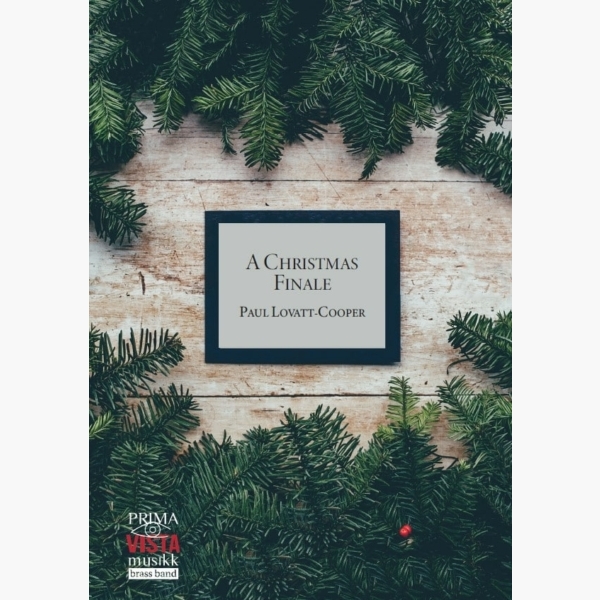Results
-
£70.00
Shine - Peter Meechan
Shine is my second large scale work for solo tuba, following on from my concerto Episodes and Echoes. Like the concerto, Shine was commissioned and premiered (with the Grimethorpe Brass Band, conducted by Howard Evans) by Les Neish - the title being an anagram of the soloist surname.Although in one movement, Shine has 3 broad sections, each requiring virtuosic skill and dexterity from the soloist. The opening section features lots of bright, metallic sounds - especially in the percussion section - providing the accompaniment to soloist as they demonstrate the range and flexibility of the tuba.The second section gives the soloist the opportunity to demonstrate the considerable lyricism that the tuba is capable of. The solo line weaves in and out of textures in the accompaniment, exchanging snippets of melody with other players in the ensemble.After a short unaccompanied passage, the final section emerges juxtaposing new solo lines and material from the opening section. This builds in momentum - and difficulty for the soloist - as the piece reaches its climatic ending.Shine is dedicated to my good friend, fellow Liverpool supporter, and amazing musician, Les Neish.Peter Meechan, 2011
Estimated dispatch 12-14 working days
-
£35.00
Song of Hope - Peter Meechan
Song of Hope is dedicated to my good friend Ryan Anthony (principal trumpet with the Dallas Symphony Orchestra) and his charity, Cancer Blows - a foundation set up to raise awareness and money to further the research that has helped give their family a hope for a future following Ryanas diagnosis of Multiple MyelomaUpon hearing the middle movement (simply titled aSonga) of my cornet concerto, Milestone, Ryan asked me if I could change the end from its current reflective ending to something more uplifting, and to title it Song of Hope, giving it much more meaning than I could have ever imagined.As well as a wind band scoring without soloist, Song of Hope exists with 1, 2 or 3 soloists, accompanied by either wind band, brass band, brass ensemble or symphony orchestra.For my friend Ryan.Each set comes with the soloist part for 1 soloist. Please download the alternative 2 or 3 soloist parts from the link above.
Estimated dispatch 12-14 working days
-
£35.00
The Pohutukawa Stands - Peter Meechan
The earthquake that hit Christchurch in February 2011 took the lives of 181 people. Being asked to write this work in their memory was an honour, but I didnat want it to simply be performed as a memorial. I wanted to compose a work that conveyed the sadness and grief for those lost - a work of remembrance - but also a piece of music that represented peace, hope and strength.The title and dedication come direct from the commissioners of the work, Woolston Brass Band. The Pohutukawa Trees stay standing and secure, defiant of the earthquake, in Christchurchas aGarden Citya, and the Pohutukawa tree also has special significance beyond their physical appearance.According to Maori mythology, the spirits of the dead travel to Cape Reinga on their journey to the afterlife to leap off the headland and climb the roots of the 800 year old Pohutukawa tree and descend to the underworld to return to their traditional homeland of Hawaiiki-a-nui, using the Te Ara Wairua, the 'Spirits' pathway'.The Pohutukawa Stands is dedicated to the lives lost in the Christchurch earthquake.
Estimated dispatch 12-14 working days
-
 £29.95
£29.95Carol of the Bells - Paul Lovatt-Cooper
Based on the famous Ukrainian Christmas Carol this piece would be a fantastic addition to any Christmas concert programme. It is ideal for any band 4th section and upwards and it has a unique twist to it with a choice of two different endings. Circa 3'00".
Estimated dispatch 5-7 working days
-
 £29.95
£29.95Christians Awake - Paul Lovatt-Cooper
This Christmas fanfare is a great way to start a concert or a second half. It has lots of excitement in the fanfare while the use of the Christmas carol Christians Awake gives it a fantastic sense of occasion. Ideal for 3rd section bands and upwards. Circa 2'10".
Estimated dispatch 5-7 working days
-
 £29.95
£29.95Rondo Alla Turk - Paul Lovatt-Cooper
Mozart is one of my favourite composers and his Rondo Alla Turk has been a popular concert piece for many performers the world over. This is an arrangement I have done for solo xylophone that shows off the technical dexterity of both the piece and the instrument. Circa 3'10". Soloist: Grade 8 ABRSM.
Estimated dispatch 5-7 working days
-
 £29.95
£29.95The Bleak Midwinter - Paul Lovatt-Cooper
The Bleak Midwinter is an arrangement of the famous Christmas Carol by Gustav Holst with words from the poem by Christina Rossetti. IT has been arranged for Bb soloist circa 3.40
Estimated dispatch 5-7 working days
-
 £34.95
£34.95When Thunder Calls - Paul Lovatt-Cooper
When Thunder Calls has been composed and designed to make it a very effective way of starting a concert or a second half of a concert and when performed with all the choreography, this piece makes for an exciting addition to any concert repertoire. Circa 3'58".
Estimated dispatch 5-7 working days
-
 £29.95
£29.95With His First Breath - Paul Lovatt-Cooper
"With His First Breath" is the lovely slow melody taken from the middle movement of my larger work Breath of Souls. It has been composed for performance by any B-flat soloist within the ensemble - Cornet, Euphonium, Baritone, Flugel or Trombone.
Estimated dispatch 5-7 working days
-
 £34.95
£34.95A Christmas Finale - Paul Lovatt-Cooper
As the title suggests, A Christmas Finale provides an ideal close to any Christmas concert. Paul Lovatt-Cooper has taken a collection of popular works associated with Christmas and expertly crafted this wonderful piece to provide both the listener and performer...
Estimated dispatch 5-7 working days
